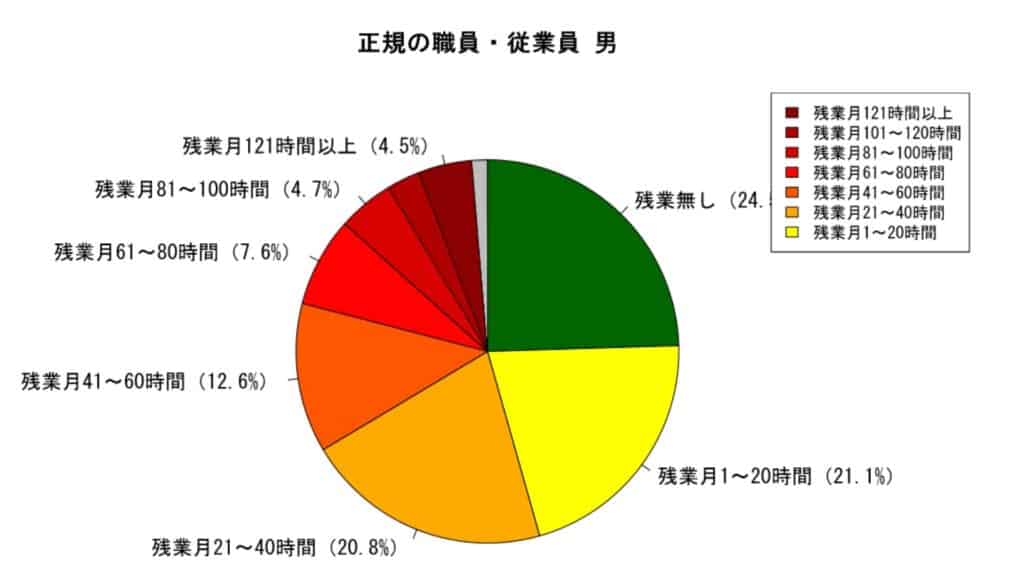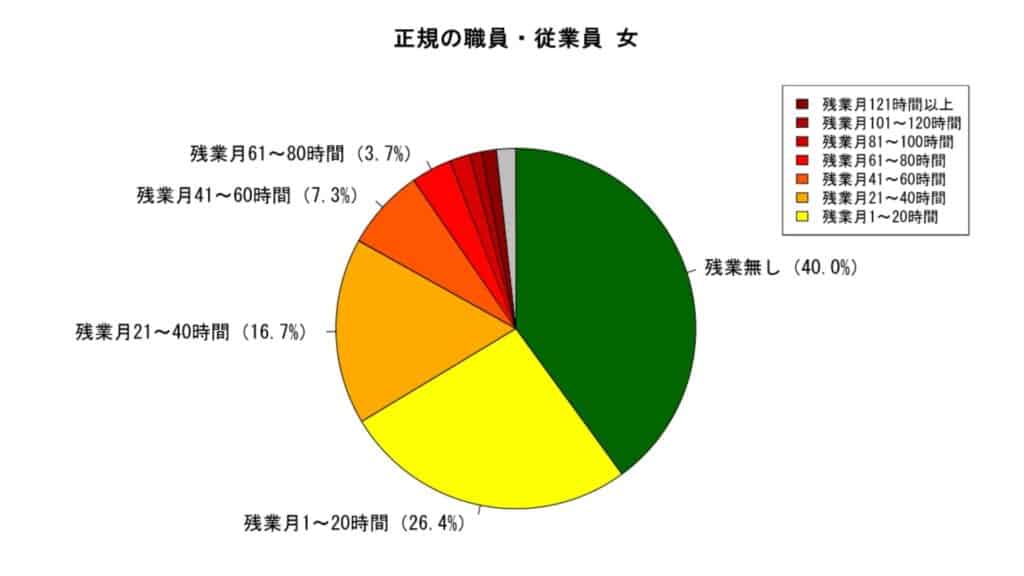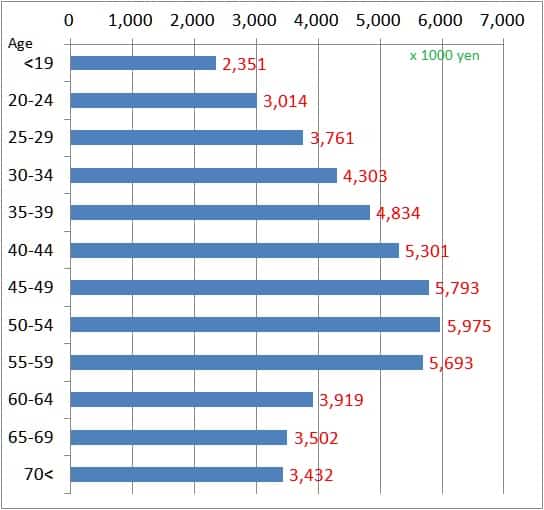If you’re planning to move to Japan long-term, understanding the job opportunities available is probably one of your biggest concerns. In this blog, we discuss some things you should consider when job-hunting in Japan and the top 5 jobs for foreigners in Japan apart from English teaching. Keep in mind that these examples are just general guidelines and you should always check job descriptions for more information.
Also read our comprehensive guides to moving to Japan, best places to live in Japan, how much does it cost to live in Japan, and how difficult it is to move to Japan.
What to Consider When Looking for Jobs for Foreigners in Japan
Working Hours

You may have heard that Japanese companies have very long working hours, and overtime often goes unpaid. According to Stat Research, the statistics for Japanese employees logging overtime per month are significant.
Japanese male employees:
- 19.6% log 60 hours of overtime work
- 12.1% log 80 hours
- 7.3% log over 100 hours
- 4.5% log over 120 hours

Japanese female employees:
- 16.7% log 21-40 hours of overtime
- 7.3% log over 40 hours
- 3.7% log 61-80 hours

Working hours can be so severe in Japan that employees sometimes take their own lives; there’s even a term for it in Japanese: karōshi (過労死, death from overwork). Thankfully, this toxic work culture is changing, after several cases gained nationwide attention, and more Japanese companies are putting systems and practices in place to avoid karōshi.
If you’re keen to save money in Japan, consider working for foreign companies and start-ups that usually have more relaxed work environments and will pay for any overtime work. Be sure to hash out these details before signing with any company!
Size of the Company

You can check LinkedIn or even the company’s official website to find information on how many employees work there. When job hunting in Japan, the size of the company could affect your decision. If you prefer smaller, more intimate companies, consider working for a school, store, restaurant, or start-up. If you don’t mind working for a large corporation, you’ll have a lot more options, both foreign and Japanese. Working for smaller companies can also help you save money in Japan due to potentially lower commuting costs.
Salary

This is probably one of the biggest factors when it comes to job hunting in Japan. Here are the average nationwide annual salaries:
- 3.45 million yen for those in their 20s
- 4.42 million for those in their 30s
- 5 million yen for those in their 40s
Careers in consulting, audit, or fields that require a special skill typically have the highest salaries. We have an infographic here about average salaries in Japan if you want more information!

Another factor in your salary is how long you work in a company. Most companies in Japan value loyalty; the longer you work in a company, the more you get paid, regardless of your contribution. This hierarchy is embedded in many traditional Japanese companies.
Coworkers

Your coworkers and colleagues can make or break the job. If you don’t speak Japanese and work in a Japanese company where the majority of the employees are Japanese, it might be difficult for you to communicate and get close with your coworkers.
If you can’t speak Japanese but hope to form close relationships with your coworkers, consider working in an international company, a startup, or a business in the service industry. This choice might also help you save money in Japan by reducing language learning costs.
Job Satisfaction

Everybody wants a job they like. If you are passionate and have experience in a certain field, start by looking for jobs in those industries. Try to have an open mind because it might be difficult to attain your dream job, especially if you are not fluent in Japanese. However, explore all your options and you might find opportunities that also allow you to save money in Japan by providing better benefits and compensation.
Language

After reading this far, you probably know by now that Japanese fluency is quite important when it comes to job-hunting in Japan. Not being able to speak Japanese will limit your options, as many will require an N1 or N2 certificate from the Japanese Language Proficiency Test (JLPT), the top two levels.
We recommend learning some Japanese, or you can look into international companies that may not require Japanese language skills. Learning the language can also help you save money in Japan by reducing everyday communication barriers and increasing job opportunities.
Check out our blog about traits of people that will be happy living in Japan to find out more about moving to Japan.
Top Jobs in Japan for Foreigners
IT Companies

If you have experience in IT such as programming and engineering, there are a lot of opportunities for you in Japan. In fact, it is one of the industries that are actively seeking foreign workers. In many cases, even if you don’t speak Japanese, you can get hired by companies in Japan. Many foreigners working in Japan, especially in Tokyo, are in the IT industry. These jobs can also help you save money in Japan due to their competitive salaries.
Nursing Care

The Ministry of Health and Welfare of Japan estimates that there will be a shortage of 380,000 nursing care personnel by 2025. Even now, there is a serious shortage of personnel in the nursing care industry. Due to this shortage, it is now easier for people to acquire a job in this field, regardless of prior experience. Working in nursing care can help you save money in Japan due to the high demand and job security.
English Teacher

English teaching jobs in Japan are probably one of the top jobs for foreigners. There are lots of English teaching jobs in Japan, and many foreigners you meet here will have worked as English teachers just to get their foot in the door.
However, many schools will require at least a Bachelor’s degree if you want to get an English teaching job in Japan. When you’re looking for a job in Japan, just bear in mind that there will be a lot of competition for these jobs in bigger cities. Teaching English can also help you save money in Japan due to the benefits often provided, such as housing allowances.
If English is not your strong suit, you can consider teaching your mother tongue as well. There may be fewer options but there will also be less competition. You may want to consider becoming a Language School Instructor.
International Companies

If you want to work for a big international company, there are many companies in consulting, banking, finance, marketing, PR, design, and similar fields. Most of these companies are in Tokyo. These positions are usually a little harder to get into and are quite competitive.
However, working for an international company can help you save money in Japan through competitive salaries and expatriate benefits.
A lot of the people working in international companies are expats that move from overseas headquarters to the Japanese branch. In this case, they are paid well and their housing is provided. If you are already working at a company that has a branch in Japan, then you can look into this option.
Japanese Companies

If you are planning to work in a Japanese company, then you have more flexibility. Keep in mind that Japanese fluency is likely to be a requirement. The working environment might also be different from what you are used to in other countries, as mentioned earlier.
When job hunting in Japan, you can check out GaijinPot, Daijob or Facebook groups to find out more about different opportunities. Keep in mind that the success rate is quite low when searching on these platforms. Try looking on LinkedIn as an alternative. This can also help you save money in Japan by accessing a wider range of job opportunities.
Most headquarters of big Japanese companies are in big cities, but there are many smaller companies all over the country. There are also many factories, such as Toyota factories, that welcome foreign workers and are situated in different parts of Japan.
Startups

When looking for a job in Japan, you will probably come across startups. There is a booming number of startups, run by both foreigners and Japanese. Most startups are within the tech industry but there are also a few in other fields. If you like working in a small team and having your voice heard, then working in a startup might be a good option for you.
Unfortunately, startups probably won’t be able to give a long-term visa. Startups also tend to have more uncertainties due to the nature of the company but offer more flexibility. Working at a startup can help you save money in Japan by providing unique benefits and opportunities.
Service Industry

The Japanese are very enthusiastic about food. As a result, Japan is full of restaurants that serve delicious food from around the world. The industry is also known for its aggressive recruitment of foreign talent due to its chronic manpower shortage.
Even if you are not confident in Japanese, you can work at a restaurant as a server or cook, depending on your work experience. Working in the service industry can also help you save money in Japan due to the high demand for workers.
Travel Industry

The Japanese travel industry is booming right now. There are countless tour companies and more and more tour guides around the country. Since the travel industry is targeted towards foreigners and tourists, Japanese language is usually not a big requirement.
If you can speak different languages, are social and good at content creation, then maybe you can look into working in the travel industry. Jobs in this sector can also help you save money in Japan due to the perks and opportunities provided.
Freelancing
If you have a technical skill, such as translation, photography, videography, marketing, graphic design and so on, then you can look into freelancing. However, keep in mind that freelancing is a difficult visa status to obtain, and jobs and projects might be quite unstable. Freelancing can also help you save money in Japan by allowing you to control your workload and potentially reducing commuting costs.
Exploring Job Opportunities for Foreigners in Japan
What do you think about these jobs for foreigners in Japan? Apart from securing an English teaching job, I hope you have found some other appealing options to explore. Japan offers a diverse range of employment opportunities for foreigners, each with its own unique benefits and challenges. Whether you’re interested in the tech industry, nursing care, international companies, or the vibrant service and travel sectors, there are many paths to consider.
Navigating the job market in Japan can be daunting, especially with language barriers and cultural differences. However, with the right approach and preparation, you can find a rewarding career that suits your skills and interests. Don’t hesitate to leverage resources such as GaijinPot, Daijob, LinkedIn, and various expat communities to aid your job search.
Find out more about Japan travel: shopping in Japan, the best souvenirs to buy in Japan, nature in Japan, camping in Japan, overnight & day trips from Tokyo, top museums to visit in Tokyo, local neighbourhoods in Tokyo, and beaches near Tokyo.
Stay tuned for more information about Japan travel, Japanese culture, moving to Japan, living in Japan, Japanese language, and more.











